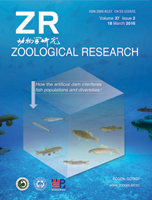
|
Zoological Research
Kunming Institute of Zoology, Chinese Academy of Sciences
ISSN: 2095-8137
Vol. 42, No. 1, 2021, pp. 28-42
|
 Bioline Code: zr21004
Bioline Code: zr21004
Full paper language: English
Document type: Research Article
Document available free of charge
|
|
|
Zoological Research, Vol. 42, No. 1, 2021, pp. 28-42
| en |
Fluoxetine ameliorates depressive symptoms by regulating lncRNA expression in the mouse hippocampus
Zhang, Chuan-Ling; Li, Yi-Jia; Lu, Shuang; Zhang, Ting; Xiao, Rui & Luo, Huai-Rong
Abstract
Depression is a prevalent mental disorder that is associated with aging and contributes to increased mortality and morbidity. The overall prevalence of geriatric depression with clinically significant symptoms is currently on the rise. Recent studies have demonstrated that altered expressions of long non-coding RNAs (lncRNAs) in the brain affect neurodevelopment and manifest modulating functions during the depression. However, most lncRNAs have not yet been studied. Herein, we analyzed the transcriptome of dysregulated lncRNAs to reveal their expressions in a mouse model exhibiting depressive-like behaviors, as well as their corresponding response following antidepressant fluoxetine treatment. A chronic unpredictable mild stress (CUMS) mouse model was applied. A six-week fluoxetine intervention in CUMS-induced mice attenuated depressive-like behaviors. In addition, differential expression analysis of lncRNAs was performed following RNA-sequencing. A total of 282 lncRNAs (134 up-regulated and 148 down-regulated) were differentially expressed in CUMS-induced mice relative to non-stressed counterparts (P<0.05). Moreover, 370 differentially expressed lncRNAs were identified in CUMS-induced mice after fluoxetine intervention. Gene Ontology (GO) analyses showed an association between significantly dysregulated lncRNAs and protein binding, oxygen binding, and transport activity, while the Kyoto Encyclopedia of Genes and Genomes (KEGG) analysis indicated that these dysregulated lncRNAs might be involved in inflammatory response pathways. Fluoxetine effectively ameliorated the symptoms of depression in CUMS-induced mice by regulating the expression of lncRNAs in the hippocampus. The findings herein provide valuable insights into the potential mechanism underlying depression in elderly people.
Keywords
Depression; Elderly; Fluoxetine; LncRNA; Chronic unpredictable mild stress
|
| |
© Copyright 2021 - Editorial Office of Zoological Research, Kunming Institute of Zoology, Chinese Academy of Sciences
Alternative site location: http://www.zoores.ac.cn/
|
|
